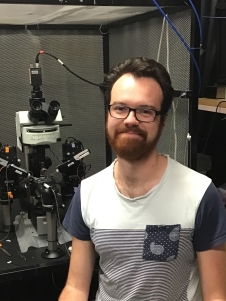PhD student Bradley Jamieson won the award for best oral presentation at the Brain Health Research Centre (BHRC) Symposium 2019 for his work on the regulation of fertility by the brain's clock. Shivani Sethi took home the trophy for the best poster presentation of her PhD work on the brain networks that are involved in altered autonomous nervous system activity in diabetes.
Speaker award for research on the brain's clock regulating fertility
 In his research in Dr Richard Piet's lab Bradley investigates whether and how a certain group of cells (vasopressin neurons) in the suprachiasmatic nucleus, a specialized region in the brain that keeps track of time and entrains the rest of the body to a day/night rhythm, affect another neuronal population (kisspeptin neurons) which is critically involved in regulating fertility. To this end, Bradley manipulates the vasopressin neurons in that they become electrically active by shining blue at them, and recording the activity of the kisspeptin neurons to see whether they respond. His data show that a connection exists, but only when the vasopressin neurons are really active, and only during parts of the estrous cycle where a connection of this kind would be required to drive ovulation in the female. Together, these data suggest that indeed the brain's master clock is involved in regulating fertility.
In his research in Dr Richard Piet's lab Bradley investigates whether and how a certain group of cells (vasopressin neurons) in the suprachiasmatic nucleus, a specialized region in the brain that keeps track of time and entrains the rest of the body to a day/night rhythm, affect another neuronal population (kisspeptin neurons) which is critically involved in regulating fertility. To this end, Bradley manipulates the vasopressin neurons in that they become electrically active by shining blue at them, and recording the activity of the kisspeptin neurons to see whether they respond. His data show that a connection exists, but only when the vasopressin neurons are really active, and only during parts of the estrous cycle where a connection of this kind would be required to drive ovulation in the female. Together, these data suggest that indeed the brain's master clock is involved in regulating fertility.
Poster award for changes in brain control of the heart in diabetes
 Shivani Sethi's PhD thesis is at the interface of the brain and how it controls the heart. This connection is changed in patients with diabetes and can have detrimental effects. Co-supervised by Dr Regis Lamberts, Associate Professor Daryl Schwenke and Professor Colin Brown, Shivani investigates a range of candidate regions in the brain which could cause those changes and she tests whether neurons in these regions are more active than usual. So far Shivani has found a few cell populations that are changed in diabetic rats, but unexpectedly she discovered even more so far unidentified neurons. Further experiments will help to pin down the circuits involved in the changed regulation of the diabetic heart.
Shivani Sethi's PhD thesis is at the interface of the brain and how it controls the heart. This connection is changed in patients with diabetes and can have detrimental effects. Co-supervised by Dr Regis Lamberts, Associate Professor Daryl Schwenke and Professor Colin Brown, Shivani investigates a range of candidate regions in the brain which could cause those changes and she tests whether neurons in these regions are more active than usual. So far Shivani has found a few cell populations that are changed in diabetic rats, but unexpectedly she discovered even more so far unidentified neurons. Further experiments will help to pin down the circuits involved in the changed regulation of the diabetic heart.
